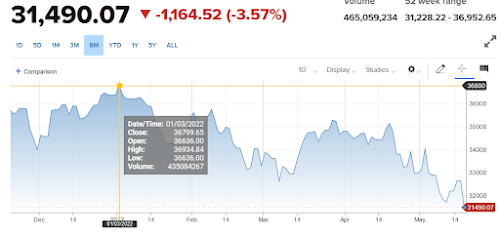One day after the Commerce Department reported strong retail sales for both March and April, there was
news from a major retailer that seemed to completely contradict those good numbers.
Target's earnings didn't hit the mark. Far from it.
The retail giant reported a stunning 52% drop in profit for the first quarter, badly missing Wall Street's forecasts. The company blamed higher expenses due to continued supply chain disruptions. Consumers also are holding back on nonessential purchases because of rampant inflation.
Shares of Target (TGT) plunged 25% Wednesday, its worst day since 1987......
It appears that Target shoppers are still spending on daily essentials, such as food and beverages and beauty products. Target said overall sales for the company were up 4% from a year ago, topping analysts' estimates.
As prices soar, consumers aren't splurging on bigger-ticket items, such as televisions and exercise equipment. The company noted that there were "lower-than-expected sales in discretionary categories," and Target was forced to write down the value of excess inventory that's stuck in warehouses.
This news and the blaming of inflation for higher costs wrecked the stock market, to the tune of a 1,164 point loss in the DOW Jones Industrial Average. The DOW is now down nearly 15% from its peak in early January.
And that came a day
after Wal-Mart also announced disappointing earnings, and saw its stock have its largest 1-day drop since 1987.
The worsening outlook shook Wall Street’s faith in Walmart’s ability to cope with higher costs for merchandise, transportation and labor. The results also underscored the pressure on US consumers as soaring prices send sentiment to the lowest in a decade. Walmart and peers already were facing tough comparisons to early 2021, when federal stimulus payments bolstered household spending during the coronavirus pandemic.
Chief Executive Officer Doug McMillon set the stage for more price increases at the world’s largest retailer, saying the company would seek to balance customers’ needs with the goal of delivering profit growth. His goal is to raise prices while seeking to stay below competitors and limiting the price bumps on entry-level food items....
Earnings are likely to drop about 1% this year, the retailer said in a statement Tuesday, abandoning its previous forecast for a mid-single-digit gain. In the first quarter, adjusted profit sank to $1.30 a share, below the lowest of 29 analyst estimates compiled by Bloomberg.
While revenue growth remained robust, U.S. sales of groceries accounted for much of the growth -- and they tend to have lower margins than general merchandise, sales of which fell. The results are a “clear negative,” Adam Crisafulli, an analyst at Vital Knowledge, said in a note to clients.
Interestingly, both Target and Wal-Mart beat estimates on revenues, but the pressures from higher costs and a need to pay higher wges to employees (THE HORROR!) hurt the retailers' profits.
So did I miss something yesterday in the strong retail report? It does seem like a few sectors drove April's increase, with one of the biggest being non-store retailers such as Amazon.com (+2.1%). That comes in contrast to big-box retailers such as Super Targets and Wal-Mart (+0.1%) and a sector of retail that sells a lot of physical things (-0.5%), whose COVID-era boom has now come back down.

And while bars and restaurants had a strong April (+2.0%) and spending on cars and auto parts rebounded (+2.2%), many areas of "store"-type retail didn't do so great. So maybe the overall spending isn't going down, but it is being displaced into other areas. And that adjustment is coming at the same time that cost pressures are hitting those same sectors.
That being said, if consumers aren't buying certain big-ticket items and there's excess inventory, shouldn't that limit inflation? My guess is that these retailers will TRY to pass along the cost increases to consumers, but if consumers aren't going to bite on that, I would anticipate inflation to level off quickly in several sectors.
And given that there has been such a labor shortage in the retail sector, causing average hourly wages to rise by 5.7% for non-supervisors in the last year, would a slowdown in demand be the worst thing there? It might buy some time and get staffing back into balance, and as long as it doesn't lead to significant job
loss , this could be a situation where cooler growth lowers inflation and gives consumers a better situation.
Sure, it might hurt the bottom lines and distress Wall Street, but given that
corporate profits went up by 25% for 2021, I think they'll get by.
Bottom line, Wall Street has been more than a bit Bubbly in recent years, and now they're getting touchy when it is obvious that they can't keep grabbing those profits forever, given labor shortages and other price-jacking by suppliers. But don't let the end of their cocaine party be something that screws it up for the rest of us. Main Street can get the upper hand here, if they choose not to accept what the big-money types are trying to push over on them.


Hey Jake you HAVE actually heard of the concept of people owning 401K's, right? Or the fact that public pension systems meet their return targets by investing in STOCKS and BONDS?? I was just thinking that 'Nah, there's NO way he could be THAT ignorant!" But then I remembered what blog I was reading...
ReplyDeleteWere you saying this when the S&P was going up 20% in 2021? And do you seriously think I don’t have investments along my looming WRS pension (which also is affected by stock market performance)?
DeleteThese traitors….ERR…traders are not people we should be basing economic policy on. I’ve lived through 2 market crashes in my adult life, and I have no illusions about these people or their incentives. Maybe you should grow up and do the same.
Jake